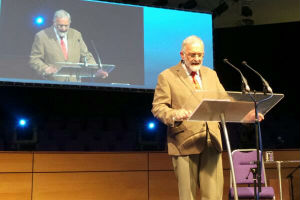
Examining Paul’s prayer in Ephesians 3:14-21, new President Chris Ellis highlighted how our faith is called to be ‘higher in our appreciation of the greatness of God; deeper in our response to his love and our willingness to open ourselves to the work of his gracious Spirit; and wider in our vision of his kingdom presence and purposes.’
Taking each point in turn, he said the “higher” of the theme invites us to come in awe before the Lord, encouraging us to see God as ‘greater than anything we can understand of express’.
The sense is reflected in the prophet known as the second Isaiah. At the beginning of his message in Isaiah 40, he doesn’t come up with ‘a strategy for self improvement’, but a focus on God, a vision of God’s greatness’.
‘Look at the sun and the moon, look at the starts – who made them? Can you count them? This is the God who comes to rescue you – to make a way through the desert and take you home.’
And although his words are powerful, their power is not in the information they communicate; ‘it’s in their pointing to God in all his almightiness to save.’
As he moved onto the “deeper” of the message, he said that to have a three dimensional faith, we need all dimensions interacting.’
‘It is not enough to praise the creator – we need to know the wonderful love of the redeemer.’
In other words, he continued, the ‘glorious almightiness’ is made known to us through Jesus, ‘in his coming close in mercy and love.’
At times we need to be stripped of our comforts and securities if we are really to throw ourselves open to God. ‘We need to be disorientated by desert experiences in order to become re-orientated with God at the centre.’
He said sometimes this happens in extreme situations – ‘when bad things happen to us or we are jolted out of the familiar’, such as the loss of a loved one - or the loss of a job – or the disintegration of a marriage – or life-threatening or life-diminishing illness....
Chris shared a period when he was diagnosed with cancer in his early 40s. ‘There were several months when I didn’t know how long I had to live.’ In that time he realised that what mattered was not his usefulness as a minister, ‘ but ‘my value’. ‘And my value to God was that I was loved – that I was precious because I was his child and not because I was a useful instrument of his purposes.’
This was a testimony he had shared with groups of busy ministers with busy diaries, ‘whose apparent hyper-activism may be a sign that they have not fully received the gospel of grace they freely preach to others.’
And if this testimony speaks to anyone, he prayed that the Holy Spirit will enable you to grasp it with both hands. To reach this place where we experience the depths of our need. ‘Grace sets us free from the activity treadmill to which our insecurities have chained us – here is an encounter with God in the depths, where we discover that we are loved.’
And the third dimension is "wider", or mission. He said that we must be careful lest our missionary urging, to go wider, does so without the resources of the height of God’s glory or the depths of God’s grace.
He quoted Robert Warren, a one-time Archbishop’s advisor on evangelism, who said that that many churches can be good at attracting customers, good at bringing them to the point of faith and commitment – but what about afterwards? ‘Strong on marketing but not so good at life-long support!’
‘In our churches, we need to ensure that new faith is nourished and that old faith is fed – that our shelves are not bare, empty of spiritual riches.’ It is crucial that we seek to be church communities in which we encourage a seeking after God, he continued.
In recent years there has been a healthy development in the wider church’s understanding of mission, which has been expressed in the Latin phrase ‘the missio Dei’ – the mission of God. This theme stresses that the mission we engage in is 'not our mission but God’s mission'.
‘It’s more than God sending us on a mission – it’s mission itself as an outpouring of God’s very life, a moving of the Holy Spirit who is the one who transforms lives and gives new life. We are enlisted to participate in this movement of the Spirit, not as freelance entrepreneurs, but as carriers of God’s love, which has seized our hearts and involves us in God’s loving of others.’
The 3-d Christianity, he continued, is where the gospel is ‘not only preached, but lived, not only known but grasped.’ It’s a joined up gospel in which spirituality and politics, justice and prayer, worship and work all interact.
‘It is the gospel in widescreen, engaging with the breadth and the depth of human need.
‘It is the gospel of a God so big that he takes our breath away.’